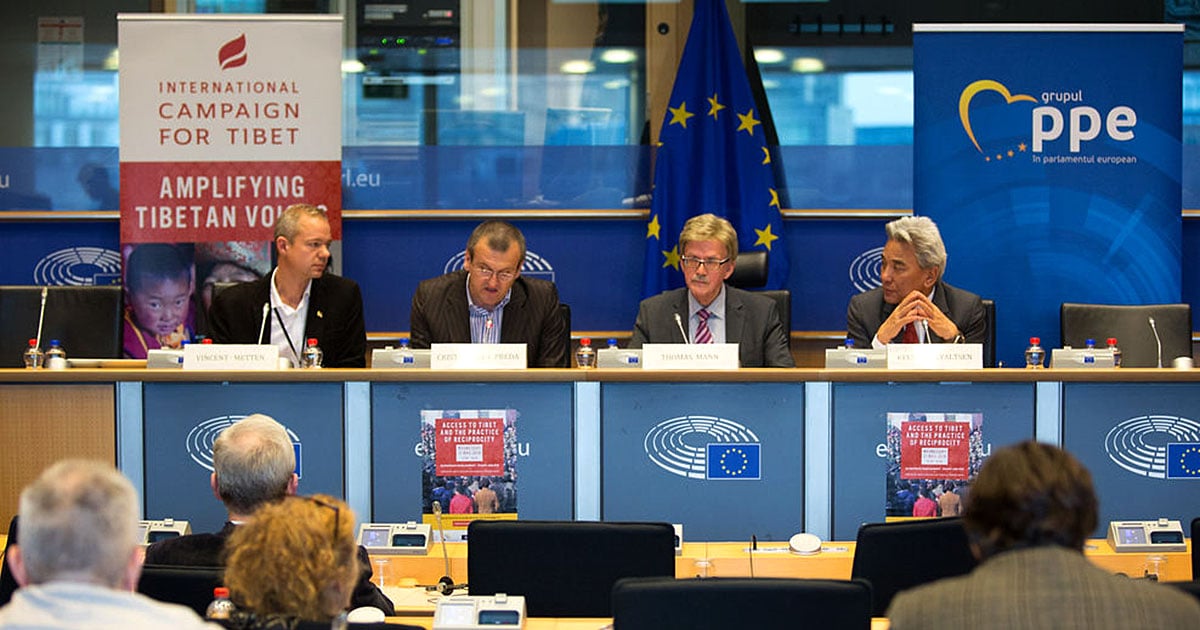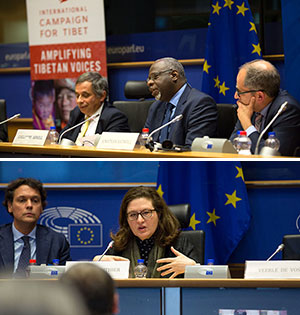
The International Campaign for Tibet jointly organized a conference with FIDH in the European Parliament last week on access to Tibet and the practice of reciprocity.
BRUSSELS — At a conference it helped organize last week inside the European Parliament on November 21, 2018, the International Campaign for Tibet led a discussion on the need for Europe to expand the notion of reciprocity—which is often invoked by European leaders as a key principle in economic and trade relations with China—to ensure the respect of fundamental rights and freedoms and to promote unfettered access to Tibet.
The conference, “Access to Tibet and the Practice of Reciprocity,” which was organized in collaboration with International Federation for Human Rights (FIDH), followed the publication in May of an ICT report revealing China’s strategies of weaponizing access to Tibet in order to prevent international scrutiny of its human rights abuses there.
The conference also built on an increasing awareness that the asymmetry in the EU-China relationship, combined with China’s growing authoritarian influence in Europe, represent a serious threat to democracies and universal values.
The event was hosted by Members of European Parliament Thomas Mann, Chairman of the Tibet Interest Group and Cristian Dan Preda, vice chair of the Subcommittee on Human Rights, who stressed that “The EU should refer to reciprocity as a key principle in terms of our bilateral relations with China.”

The International Campaign for Tibet jointly organized a conference with FIDH in the European Parliament last week on access to Tibet and the practice of reciprocity.
In a lively debate moderated by Gregory Bruno, a journalist who spent many years living in and writing about China and Tibet, independent experts, journalists, a representative of the European External Action Service (EEAS), national parliamentarians and officials discussed the consequences of China’s restrictions on access to Tibet, both for human rights in Tibet and for rights and freedoms in Europe.
Sharing his experience of visiting Tibet via a video message, Manfred Nowak, former UN Special Rapporteur on Torture, described the difficulties for independent observers to access Tibet, which allows the Chinese government to continue violating the fundamental rights of Tibetans without accountability.
Ursula Gauthier, a French journalist who was formerly based in Beijing and who visited Tibet on several occasions before she was expelled from China in 2016 following an article critical of Chinese policies in Xinjiang, said, “There is no reciprocity with China…It is, for instance, incredible that a huge phenomena such as self-immolation has not been covered adequately. This is a scandal.”
Speakers also explored ways in which the European Union and its Member States could promote reciprocity in their relationships with China beyond trade and economic relations.
Bas Belder, Member of the European Parliament and Rapporteur of the recently adopted European Parliament report on the state of EU-China relations, said that “A critical principle for solid relations between the EU and China is reciprocity, but preferably in all areas, for example as regards to market access, but equally as regards to freedom of the press. Reciprocity fosters mutual trust, establishes a solid foundation for a strategic partnership between the EU and China that this very promising partnership honestly deserves.”
Also contributing to the discussion via video message, United States Rep. Jim McGovern (D-Mass.), the main sponsor of the Reciprocal Access to Tibet Act, which was recently passed by the US House of Representatives, presented the bill and suggested cooperation between the US and Europe on this issue.
The presentations at the conference, including exchanges of views with the participants, will be encapsulated in a policy paper that will include concrete recommendations on how to rebalance the asymmetrical EU-China relationship, particularly in the field of access to respective territories, and will then be disseminated to policy-makers in Europe.
ICT and FIDH’s joint conference was followed by a cocktail reception at the Bibliothèque Solvay in the heart of the European Union quarter in Brussels to mark ICT’s 30th year of existence. The event gathered human rights and Tibet activists, EU and national officials and parliamentarians and members of the Tibetan Community in Belgium. Highlights of the event included the photo exhibition “Tibet, in the shadow of the roof of the world” by Portuguese artist Carlos Brum Melo, as well as traditional Tibetan music and dances.
During the conference, Kelsang Gyaltsen, former Special Representative of His Holiness the Dalai Lama for Europe, delivered a tribute to Lodi Gyari, ICT’s former president and executive chairman, who passed away Oct. 29 and had many friends among parliamentarians, diplomats and political leaders in Europe and around the world.
Watch a video recording of the conference “Access to Tibet and the Practice of Reciprocity” here:

